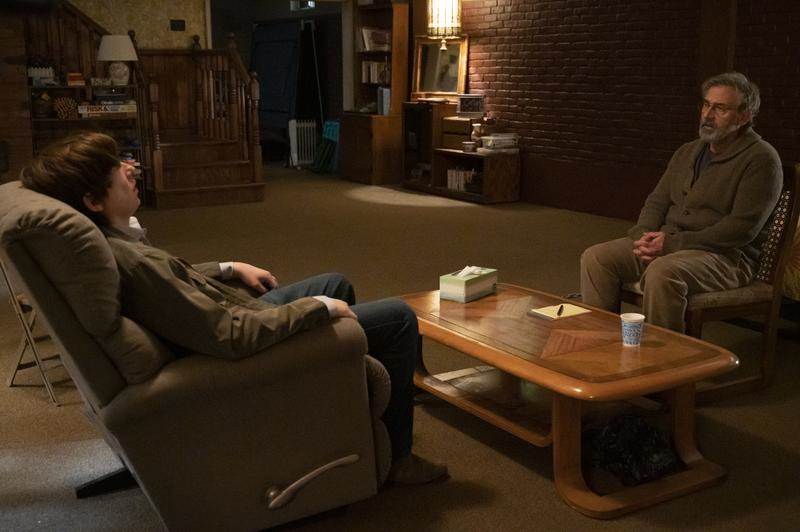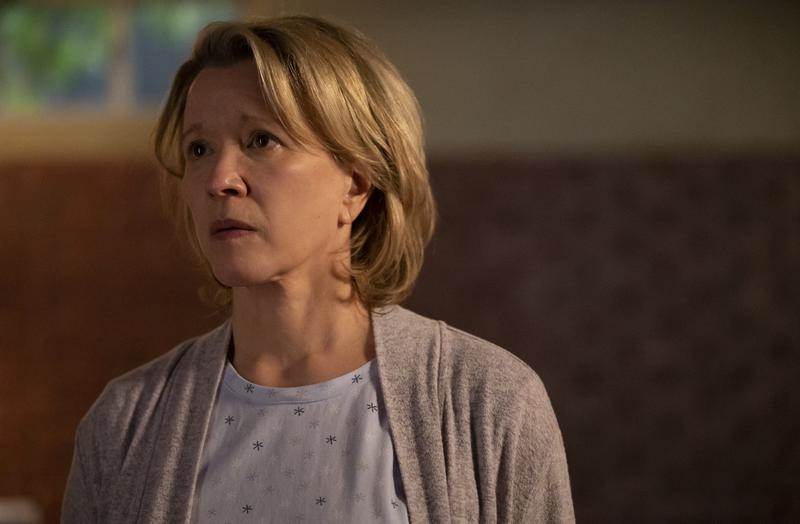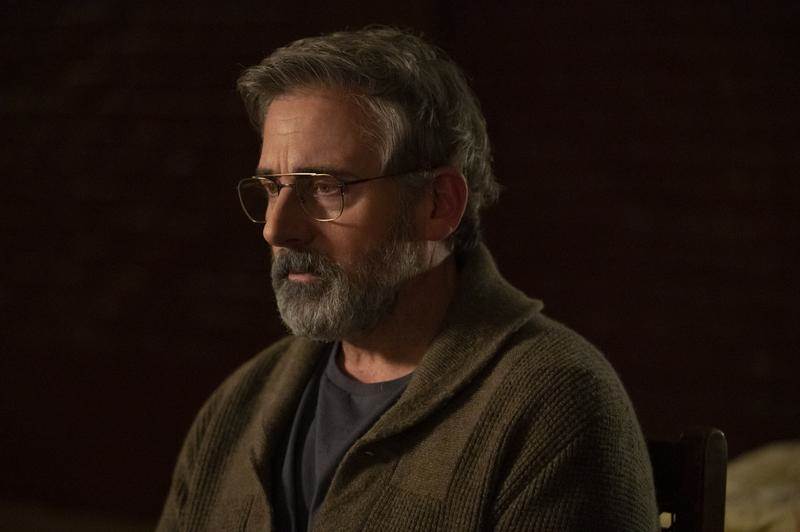In an effort to stop Sam from murdering Elias, Dr. Alan Strauss sent The Patient to visit with his ex-wife. Will it do any good? We find out in “Pastitsio,” the fifth episode of the FX drama series. Here’s a recap of this week’s session.
“Get Along” by Kenny Chesney plays so loud that you can hear it from outside the truck as Sam Fortner (Domhnall Gleeson) drives to his ex-wife’s house. Knocking on the door, Mary (Emily Davis) answers and is surprised to see him. He tells her his therapist told him to talk to her and she seems pleased to hear that he’s in therapy. They sit at her kitchen table, and Sam asks how Har is doing, a child they sponsored together in Bangladesh. Mary tells Sam about Har’s favorite foods, panta bhat and bhuna khichdi, surprised that Sam’s never tried either given his adventurous palette. He asks if Mary told Har that they split up and she reminds him that it’s against the rules to talk to the kids they sponsor about anything upsetting in their family life. “I actually have another one now, too,” Mary reveals. She shows Sam a picture of Moontaha. The conversation switches to No Shoes Nation and Mary asks Sam if he saw Kenny Chesney last summer. He tells her about going to concerts in both Raleigh and Chicago, after which they seem to run out of things to talk about. Mary asks Sam if there was anything specific his therapist wanted them to talk about. “I don’t know,” Sam shrugs, “he just said I should talk to you.” After another awkward moment of silence, Mary asks Sam if he still wants his La-Z-Boy chair he never picked up. She helps him load it into his truck.
Meanwhile, Dr. Alan Strauss (Steve Carell) talks to Elias (Alex Rich) through the door, with the bound captive telling Alan that they shouldn’t give up without a fight. He asks Alan if he could convince Sam to bring him into a session, during which they could attempt to overpower Sam. As Alan agrees to the plan, he tells Elias that he may be the one who makes it out alive and if that’s the case, he’d like him to pass along a message to his children. “Tell my daughter, Shoshana, that I love her and that I treasured our life together and that I want her to find a way to move on. Ezra, my son, tell him I loved him very much and that his mother loved him, too. Even when it was difficult between them. And that I’m sorry there was so much conflict in the family when she was dying.” Alan stops, realizing that this is a lot for Elias to remember. However, Elias asks Alan to keep talking and he goes on, talking about how Ezra fell in with a Rebbe in a black hat at college and suddenly became Orthodox, which drove Alan’s wife crazy. “His family couldn’t even come over to our house without bringing their own food,” Alan adds, describing their kosher lifestyle.
The sound of tires on gravel interrupts Alan’s monologue, pausing to watch as Sam drags his La-Z-Boy into the basement through the sliding glass door, positioning it on his side of the coffee table and removing the folding chair he’d been using during therapy sessions. “I got my chair back,” Sam says as he sits in it and begins moving objects around on the coffee table so that they are all straight. Alan asks Sam what he and Mary talked about and he brings up the new child she is sponsoring. Alan asks how it felt to see her. “I liked it,” Sam shares, “but I don’t think it accomplished what you were hoping.” Alan pulls Sam’s attention back to the kids Mary sponsored in Bangladesh, talking about how Sam would want them to grow up and be responsible for themselves, not blame the world for the life they were born into. But the conversation about kids has redirected Sam’s mind back to his own childhood. He starts to rant about how any adult could abuse a child, getting out of the recliner and pacing, before directing his anger at the closet door that conceals Elias. He charges towards the door and Alan begs him to wait. Sam doesn’t listen, so he calls for Sam’s mother Candace (Linda Emond), who rushes downstairs.
Sam stops when he hears his mother yell his name. “You are supposed to be protecting me by not doing this,” she reminds him, clapping her hands to get his attention back on her. “Go to your room right now.” Sam’s eyes have welled up with tears as his mother tells him he needs a good night’s sleep. He has tears in his eyes as she tells him he needs a good night’s sleep. She turns around and goes upstairs, turning out the light as she washes her hands of the scene. Sam locks the closet door and heads to his room, slamming the door. Alan hears Sam let out a scream before turning on his stereo, blasting Kenny Chesney’s “I Go Back” loudly. After drumming the rhythm on his knees, he opens his laptop and visits a No Shoes Nation chatroom, asking his online friend Nancy how the show in Reno was.
Alan tries to go through his nightly routine as if everything is normal. He opens his bottle of prescription drugs and counts how many pills are left before pouring himself a glass of water from the pitcher by the bed. We also see him rubbing ointment onto his feet. As Alan lays in bed, he recalls a happy memory of his family. His wife Beth (Laura Niemi) was singing for her synagogue and young Ezra (Lucas Grant) was sitting in his father’s lap, moving to the music and wanting to join his mommy. Wiggling off Alan’s lap, little Ezra ran to his mom on the stage, who reminded the service that she’s both a mother and a cantor. She sits down with Ezra and asks him what song he wants to sing. “I Got That Shabbat Feeling,” he replies and they lead the whole kahal kodesh in singing it.
It was a restless night for both Sam and Alan. The moment Sam’s door opens, Alan gets up and moves to the chair, gestruing for Sam to join him for a session. The sun has not fully risen yet, so Sam turns on the lights before groggily reclining in his La-Z-Boy. “You told me that you get very angry with people who treat you rudely,” Alan starts. “That everyone you hurt somehow deserves what happens to them and I’m starting to think that’s not what’s actually going on, Sam.” Alan believes Sam’s pain from being abused as a child has manifested as uncontrollable anger that he misdirects at others. Alan goes as far as to tell Sam that none of his victims deserved to be murdered, that they just happened to be present when his anger flared up. Sam gets visibly upset, justifying that every one of them deserved it and fixing is gaze on the closet door, telling Alan that he doesn’t know how rude this guy was. “They didn’t do anything to provoke your attacks any more than you provoked your father,” Alan tells Sam. “He was just a violent, out of control abuser. You aren’t responsible. You were just a little boy. Elias Postacky in there, he didn’t do anything to deserve this either. He’s just a guy who cooks, manages a Greek restaurant, makes food that you like. He got into a little tangle with you over an inspection.” Sam tries to describe the way Elias looked at him, but he’s consumed by so much anger that the words don’t flow. Alan asks Sam to bring Elias out of the closet to talk, encouraging his patient to get to know him and see that he’s not a bad person. “I don’t want to,” Sam snaps. “I want him dead.”
On Alan’s insistence, Sam goes to the closet door and opens it, dragging Elias out, who groans in pain and struggles. Elias is bound with duct tape, which also covers his eyes so he can’t see anything. Sam sits Elias in the folding chair and takes his seat back in the recliner, looking agitated. Sam looks at alan and turns up his hands to ask what happens next. Alan tells Sam that he and Elias have been talking and he believes Elias is a good man. “Elias, we want you to show your full self here so he can see you as something more than he does right now,” Alan tells the young man. Elias seems to have a hard time speaking, whether due to fear, dry mouth, or a mix of both. Alan asks him to explain how he came up with the Pastitsio and he stammers about how his parents immigrated from Greece. He’s barely begun to talk about himself when Sam shakes his head and stands up, pacing. Sam turns and faces Elias. It happens so fast, he lunges at his victim and knocks him backwards off his chair. He pins him down, putting weight on his chest and strangling him. Alan screams for Sam to stop. He yells for Candace to come do something. He watches Elias’s legs kick in the air, missing their target because Sam is crouched right over his chest as he chokes the life out of him. Elias’ legs extend out and go still. Alan, on his knees at the foot of the bed he’s chained to, buries his head in the sheets and lets out a sob.
Alan doesn’t make eye contact with Sam as he gets up and walks back to his bedroom, closing the door. We see Sam let out a sigh, this was clearly a lot for him. He goes to his closet and pulls out a banker’s box, setting it on his bed and getting on his knees as he opens it. The box is full of wallets and watches, souvenirs from Sam’s other victims. He begins to take them out, lining them up neatly in a row on his bed. He wraps his arms around the box and seems to hug it, as if it brings him comfort.
Upstairs, we see Candace in bed. Her eyes are open. Her left hand covers her mouth. She’s in shock, having heard what just happened in her own basement.
Next week we’ll meet “Charlie,” the title of the sixth episode. Stream it on Hulu on September 27th and check back here afterward for another detailed recap. For now, here’s what’s on next week’s agenda:
Dr. Strauss struggles with the reality he finds himself in. Sam is consumed with practical necessities, but agrees to his therapist’s advice to make different choices. Written by Joel Fields & Joe Weisberg; Directed by Gwyneth Horder-Payton.



